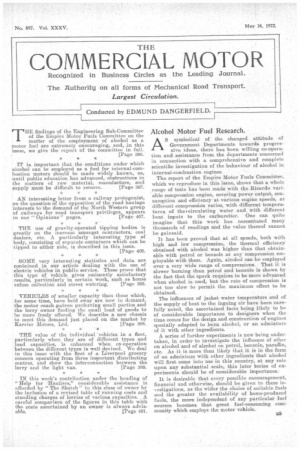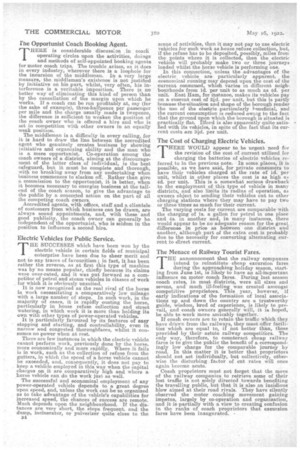Alcohol Motor Fuel Research.
Page 1

Page 2

If you've noticed an error in this article please click here to report it so we can fix it.
S symbolical of the changed attitude of Government Departments towards progres sive ideas, there has been willing co-operation and assistance from the departments concerned in connection with a comprehensive and complete scientific investigation of the behaviour of alcohol in internal-combustion engines.
The report of the Empire Motor Fuels Committee, which we reproduce in this issue, shows that a whole range of tests has been made with the Ricardo variable compression engine, covering power output, consumption and efficiency at various engine speeds, at different compression ratios, with different temperatures of thea circulating water and with different heat inputs to the carburetter. One can quite imagine that this work has necessitated many thousands of readings and the value thereof cannot be gainsaid.
It has been proved that at all speeds, both with high and low compression, the thermal efficiency obtained with alcohol was higher than that obtainable with petrol or beneole at any compression employable with them. Again, alcohol can be employed over a very -Wide range of compressions. That it is slower burning than petrol and benzoic is shown by the fact that the spark requires to be more advanced when alcohol is used, but the rate of compression is not too slow to permit the maximum effect to be obtained.
The influences of jacket water temperature and of the supply of heat to the ingoing air have been carefully noted, the ascertained facts being likely to be of considerable importance to designers when the time comes for the design and construction of engines specially adapted to burn alcohol, or an admixture of it with other ingredients.
A series of further experiments is now being undertaken, in order to investigate the influence of ether on alcohol and of aleohol on petrol, benzole, paraffin, etc. As it is more than likely that it is in the form of an adinixtuee with other ingredients that alcohol will first come into use in this country, at any rate upon any substantial scale, this later !series of experiments should be of considerable importance.
It is desirable that every possiBle encouragement, financial and otherwise, should be given to these investigations, as the wider the choice of suitable fuels and the greater the availability of home-produced fuels, the more independent of any particular fuel sources becomes that great fuel-consuming cornminaity which employs the motor vehicle. THERE is considerable discussion in coach operating circles upon the activities, doings and methods of self-appointed booking agents for motor coach trips. The trouble arises, as it does in every industry, wherever there is a loophole for the incursion of the middleman. In a very large measure, the middleman's existence is not justified by initiative on his part, whilst, very often, his interference is a veritable imposition. There is no better way of eliminating this kind of person than by the cancellation of the margin upon which he works. If a coach can be run profitably at, say (for the sake of example), three-halfpence per passenger per mile and the charge usually made is twopence, the difference is sufficient to weaken the position of the coach owner who is offered a hire and who is set in competition with other owners in an equally weak position.
The middleman is a difficulty in every calling, for it is hard to draw the line between the accredited agent who genuinely creates business by showing initiative and organizing ability and the man who is a mere opportunist. Co-operation among the coach owners of a district, aiming at the discouragement of the latter class of individual, is the best safeguard, but it must be complete and thorough, with no breaking away from any undertaking when business commences to slacken off. Rather than give a commission to the opportunist, it is better, when it becomes necessary to energize business at the tailend of the coach season, to give the advantage to the public by a concerted action on the part of all the competing coach owners. Accredited agents, with offices, staff and a clientele of customers from which business can be drawn, are always sound appointments, and, with these and good publicity, the coach owner can generally be independent of the opportunist, who is seldom in the position to influence a second hire.
ElectricVehicles for Public Service.
THE' SUCCESSES which have been won by the electric vehicle in certain fields of municipal . enterprise have been due to sheer merit and not to any traces of favouritism ; in fact, it has been rather the reverse, as at first this type of machine was by no means popular, chiefly because its claims were over-rated, and it was put forward as a competitor of petrol and steam vehicles in classes of work . for which it is obviously unsuited. It is now recegnized as the real rival of the horse in work necessitating a comparatively low mileage with a large number of stops. In such work, in the majority of cases, it is rapidly ousting the horse, particularly in house refuse collection and street watering, in which work it is more than holding its own with other types of power-operated vehicles. It is particularly favoured by its features of easy stopping and starting, and controllability, even in narrow and congested thoroughfares, whilst it consumes no power when at rest.
There are few instances in which the electric vehicle cannot perform work, previously done by the horse, more economically and more rapidly. Where it fails is in work, such as the collection of refuse from the gutters, in which the speed of a horse vehicle cannot be exceeded, and, consequently, it does not pay to keep a vehrcle employed in this way when the capital
charges on it are comparatively way and where a horse vehicle can do the work just as well.
The successful and economical employment of any power-operated vehicle depends to a great degree upon speed, and, unless the work can be so organized as to take advantage of the vehicle's capabilities for increased speed, the chances of success are remote. Much depends upon the neighbourhood. If the distances are very short, the stops frequent, and the dump, incinerator, or pulverizer quite close to the
n4 scene of activities, then it may not pay to use electric vehicles for such work as house refuse collection, but, if the refuse has to be deposited, possibly, miles from the points where it is collected, then the electric vehicle will probably make two or three journeys loaded whilst the horse vehicle is performing one. In this connection, unless the advantages of the electric vehicle are particularly apparent, the economical running may depend upon the cost of the current consumed, which varies in different neighbourhoods from lcl. per unit to as much as 4d. per unit. East Ham, for instance, makes its vehicles pay on a cuprent cost of 20. per unit, but this is partly because tlaersituation and shape of the borough render the use of the electric particularly beneficial, and the current consumption is reduced owing to the fact that the ground upon which the borough is situated is practically_ fiat. Ilford is also apparently quite satisfied with its vehicles, in spite of the fact that its current costs are 30. per unit.
The Cost of Charging Electric Vehicles.
HERE WOULD appear to be urgent need for the revision of the cost of current utilized for charging the batteries of electric vehicles referred to in the previous note. In some places, it is possible, as we have said, for private consumers to have their vehicles charged at the rate of id. per unit, whilst in other places the cost is as high as 4d. per unit. This is a somewhat serious drawback to the employment of this type of vehicle in many districts, and also limits its radius of operation, as owners object to sending their vehicles out to other charging stations where they may have to pay two or three times as much for their current.
The varying costs for current are comparable with the charging of is. a gallon for petrol in one place and 4s. in another and, in many instances, there would appear to be no adequate reason for the great difference in price as between one diStrict and another, although part of the extra cost is probably due to the necessity for converting alternating current to direct current.
The Menace of Railway Tourist Fares.
THE announcement that the railway companies intend to reinstitute cheap excursion fares during the approaching holiday season, starting from June 1st, is likely to have an all-important influence on motor coach fares. During last season coach rates, in most districts, were all sixes and sevens, and much ill-feelingwas created amongst competitive proprietors. This year, however, . if early indications of the formation of local associations up and down the country are a trustworthy guide, wisdom, bred of experience, is likely to prevail, and coach owners generally will, it is hoped, be able to work more amicably together.
If coach owners are to retain the traffic which they have tlfawn from the railways, they must offer facilities which are equal to, it not better than, those provided by their astute railway competifors. The only way, therefore, to counteract cheap railivay fares is to give the public the benefit of a correspondingly low charge for the comparable journey by road. In this matter it is better that proprietors should not act individually, but collectively, otherwise the disturbing factor of cut rates will once again become acute.
Coach proprietors must not forget that the move of the railway companies to retrieve some of their lost traffic is not solely directed towards benefiting the travelling public, but that it is also an insidious blow aimed at their road rivals. They have silently observed the motor coaching movement gaining impetus, largely by co-operation and organization, and it is partially with a view to creating confusion in the ranks of coach proprietors that excursion fares have been inaugurated.
































